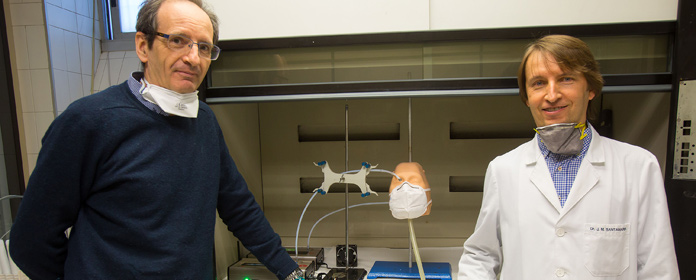Two scientists from the University of Navarra test the efficacy of some types of protective masks
Researchers have evaluated the quality of 40 types of masks for healthcare professionals produced by 18 suppliers.

PHOTO: Courtesy
Two scientists from the University of Navarra are evaluating the quality and effectiveness of some protective masks used by healthcare professionals. They are Arturo Ariño, director of department of Environmental Biology of the University of Navarra, and Jesús Miguel Santamaría, director of high school of research in Biodiversity and Environment of the academic center.
Although the first requests for analysis came from the Clínica Universidad de NavarraAlthough the first requests for analysis came from the company, more than 60 tests have already been carried out on samples from other organizations and individuals. In total, 40 types of masks from 18 different suppliers have been tested.
The goal of this work,points out Ariño, is "toprotect those who protect us", that is, to analyze the quality of the masks -new and recycled- to know which ones can reduce the possibility of contagion of the health professionals who take care of people infected by coronavirus on the front line. "Their work is fundamental for the well-being of everyone and we must do everything in our power to protect them," adds Santamaría.
The aim of this study is to find out what capacity the masks have to block the entrance of particles. "The droplets exhaled by people can have a diameter of slightly less than 5 microns and we are checking whether these particles, as well as those of the same size as viruses (less than a third of a micron), are capable of crossing the protective barriers," Santamaría explains.
These scientists from the School de Ciencias use a technique -based on laser light scattering- to quantify the particles in the air that pass through the masks. "We use a medical mannequin that we force to 'breathe' through the mask, taking 74 readings every 6 seconds that are transmitted to computers and then analyzed," says Ariño.
Recommendation of the use of approved masksAriño and Santamaría are forceful in their recommendation to use approved masks, since handmade masks have a lower level of protection, due to the materials used in their manufacture. In this sense, these researchers recommend both to companies that have reconverted their commercial activity to the manufacture of health protection material and to people who are making masks at degree scroll individual to follow the instructions of the health authorities. "The usefulness of handmade masks as protection staff is very limited. Blindly relying on them to protect oneself can end up making the problem worse, as it gives us a false sense of security and we can let our guard down, neglecting other necessary measures," Ariño points out.
These researchers also reflect on the importance of fitting masks properly during use. "We have found that very efficient masks are useless if they are not perfectly adjusted, so it is vital to make an effort to put them on correctly," concludes Santamaría.
